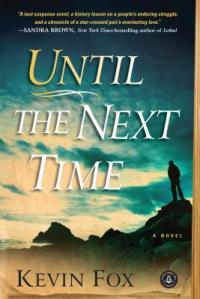Riveting suspense drives masterful Irish reincarnation novel
Kevin Fox’s reincarnation novel explores political strife, religious intolerance, and enduring love that spans centuries, played out against the lush backdrop of Northern Ireland. He doles out hints and teasers so skillfully that the story rushes forward at breakneck speed as you chase down clues until the entire puzzle falls into place–revealing a satisfying portrait of romance, spirituality, and history that transports you to an Ireland you may not have known existed.
Story: For Sean Corrigan the past is simply what happened yesterday, until his twenty-first birthday, when he is given a journal left him by his father’s brother Michael—a man he had not known existed. The journal, kept after his uncle fled from New York City to Ireland to escape prosecution for a murder he did not commit, draws Sean into a hunt for the truth about Michael’s fate.
Sean too leaves New York for Ireland, where he is caught up in the lives of people who not only know all about Michael Corrigan but have a score to settle. As his connection to his uncle grows stronger, he realizes that within the tattered journal he carries lies the story of his own life—his past as well as his future—and the key to finding the one woman he is fated to love forever. (From amazon.com)
Spiritual/metaphysical content: High. Using the framework of The Troubles in Northern Ireland during the 1970s, Fox illustrates that, on both an individual and societal level, belief in reincarnation can provide a “different set of moral guideposts” than enables people to seek justice instead of retribution, and eventually move on to “a more aware and enlightened way of living.”
An intriguing mixture of ancient rites, Buddhist principles, and “enlightened” Catholicism drive the story at a relentless pace. Reincarnation and Catholicism? It’s a more natural fit than you might suspect. A recent article in the Catholic Herald states that 29.9% of self-described Irish Catholics believe in reincarnation. Fox presents a persuasive case, pointing out that reincarnation has been a feature of nearly every world religion except Christianity, and that Jesus’ actual words support reincarnation even though later Bible authors have reinterpreted their meaning.
This spiritual novel suggests that some people can remember their past lives more easily; that knowledge is passed down through families and within clusters of those who remember. Using an ancient Druid rite of passage, they awaken others because, when individuals view their actions through the broader lens of reincarnation, penance and forgiveness can occur mindfully in one or two lifetimes instead of playing itself out over many generations.
My take: The power of Until the Next Time springs from Fox’s remarkable ability to thread extensive historical and philosophical detail into crisp dialog and a clever plot that drives every character’s decisions. Similarly themed spiritual fiction sometimes adds a layer of pedantic preaching atop the plot, but Fox handles exposition so smoothly, it rarely disturbs the reader’s immersion within the story.
Understanding reincarnation is both the heart of the novel’s conflict and the key to resolving it. Fox uses the sprawling canvas of Northern Ireland and England spanning millenia to demonstrate how the typically abstract theory of reincarnation has shaped the Corrigan family’s history in very concrete ways. The characters’ choices determine their karma/fate/destiny; negative choices require penance and forgiveness, often through multiple lifetimes, until they absorb a particular lesson. This is not a philosophical notion for the Corrigans but a pattern of brutal action and reaction that drives war and aggression across centuries, culminating in Ireland’s Bloody Sunday and the brutal crackdown that followed.
Fox is a remarkable writer; he employs dialect so skillfully that I could hear an Irish lilt echoing in my head as I read. The novel’s structure is complex–three parallel stories spanning multiple generations, told through two points of view. Figuring out who is narrating the story is tricky at first, but the reader catches on fairly quickly. Beautifully written and paced, the novel’s spiritual and historical reach took my breath away. I immediately searched Amazon for more novels by Kevin Fox; regretfully, they do not exist yet. Until the Next Time is a wonderful example of how, as Fox explains, “Fiction is the lie that illuminates a greater truth.”
Details:
Until the Next Time, by Kevin Fox
Algonquin Books, 2012
Paperback, 400 pages
Buy at Amazon


Okay, this is a novel I have to read. I’m heading over to Amazon now. Thanks for the review.
I loved this book so much I read it twice. It also made me want to visit Ireland, as my Mother was half Irish and I don’t know much about my family history on her side.
I agree, Jean. It was one of the most insightful looks into “The Troubles” that I’ve read, and I really learned a lot. And the spiritual angle made it so much more interesting. I’m glad you enjoyed it.
Pingback: Book review: Walking In « Fiction for a New Age
Pingback: Book review: Threads–The Reincarnation of Anne Boleyn « Fiction for a New Age
Pingback: Book review: The Fourth Awakening « Fiction for a New Age
Pingback: Book review: Scholar of Moab « Fiction for a New Age
Pingback: Book review: Yü: A Ross Lamos Mystery « Fiction for a New Age
Pingback: Book review: The Time Keeper by Mitch Albom « Fiction for a New Age
Pingback: 10 metaphysical fiction books that speak to your soul « Fiction for a New Age
Pingback: Guest review: Celtic Twilight by W.B. Yeats « Fiction for a New Age
Pingback: Book review: Infinite Sacrifice | Fiction for a New Age
Pingback: Book review–Mixer: on a Strand | Fiction for a New Age
Pingback: Book review: Unison (The Spheral) | Fiction for a New Age
Pingback: Book review: Transforming Pandora | Fiction for a New Age